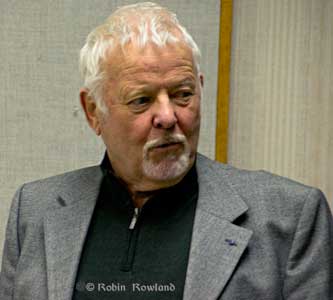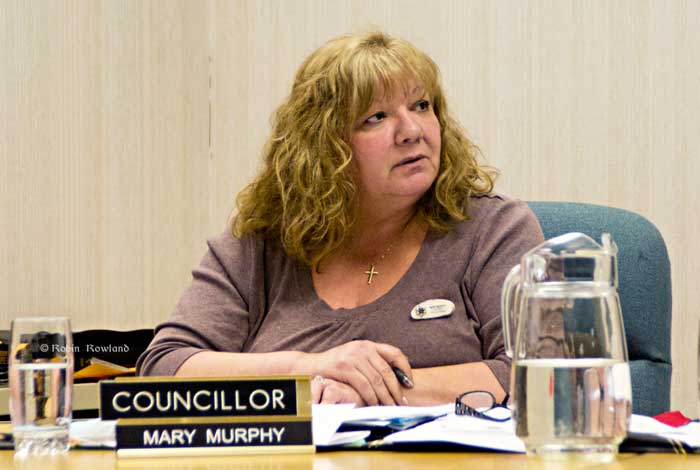The environmental group, Douglas Channel Watch, Monday, Feb. 20, called on the District of Kitimat Council to “get off the fence” and oppose the Enbridge Northern Gateway pipeline.
Dieter Wagner, spokesman for Douglas Channel Watch, addressed the council at its regular meeting. His call came after both Terrace Council and the Skeena Queen Charlotte Regional District voted to oppose the controversial pipeline that would carry bitumen from Alberta to the port of Kitimat and condensate back to Alberta.
The council listened to Wagner’s presentation but took no action, despite calls at the close for a referendum on the issue.

“Our group and many others can’t quite comprehend why our mayor and council hold the position of neutrality regarding the Northern Gateway. We are requesting you to abandon this position and officially oppose this project,” Wagner said. “Few places tend to lose as much as Kitimat does from the inevitable dilbt spill, either in our river system or our marine environment.”
(“Dilbit” is the industry term for “diluted bitumen.” The pipeline from Alberta will carry oil sands bitumen but for it flow through the pipeline, it must be diluted using a form of refined natural gas called condensate.)
Wagner said that most of the “massive amount of information available on everything concerning this project” is negative. He warned that some documents said there is even a risk of death and injury if humans are exposed to dilbit. He also said that in his view, neither Enbridge nor any level of government have given people enough warning and education abut the effects of a dilbit spill.
Wagner returned to a point made time and time again by Douglas Channel Watch, that is often the local people who detect pipeline spills, sometimes by smelling them, not the sensors used by Enbridge. He cited the case of the Enbridge pipeline breach at Kalamazoo, Michigan, where the spill was reported by calling 911 to local police, rather than by Enbridge’s Edmonton control centre.
Wagner pondered who would detect such a spill on the Kitimat River where there is nobody to report it.
“We are concerned who would detect a spill along the Kitimat River, especially in winter time,” he said. “If there is a spill in the upper Kitimat River, no one will know about it until it gets way down here.”
He maintained that the Gateway project has not adequately addressed the issue of emergency response along the water courses, a point that Enbridge would certainly dispute, given the thousands of pages of documents it has filed with the Joint Review Panel concerning emergency procedures and contingency plans. (For example, Douglas Channel Watch recently objected to an Enbridge plan to burn the Kitimat estuary if there was an oil spill there)
Wagner then turned to the sinking of the cruise ship Costa Concordia off Italy. “The latest technology is no absolute safeguard against a shipping disaster,” he told the councillors. “Cruise ships are normally really well equipped to take care of thousands of people. No technology has yet been invented to deal with human error. Many of these things are due to human error, not equipment failure.”
He quoted the Polaris Institute which he said has found there were 204 spills in Enbridge pipelines from 1999 to 2010, spills which leaked 169,000 barrels of oil into the environment.
Wagner then turned to the growing controversy over the credibility of the Joint Review Process, especially due to political interference by Prime Minister Stephen Harper and members of his cabinet.
“We believe it is better to be proactive to influence the JRP, rather than wait for their decision,” he said’ “When they have made their decision, it is no good, it [ a decision by Kitimat] has to be done before, by making it known that our community does not support this project.”
“The impartiality of the JRP is already threatened by the federal and provincial government officials. Mr Harper in China has already said this project is gong to go ahead and you’re going to get yours, so why are we having the JRP hearings?
“We believe that the management of large corporations and foreign political interests are not in the best interest of our community; the environmental movement has been labelled as enemies of the state by Prime Minister Harper and [Natural Resources] Minister [Joe] Oliver.
Wagner added that support “for these so called radicals, so called enemies” is growing, as seen through growing contributions to the environmental groups.
“When our government labels every day citizens who are actively participating in democracy and its processes, we feel that we need to speak out against that and to address the serious levels of interference we face on the issue,” Wagner said.
“We believe not in the risk of a spill we believe that a spill is a certainty.”
He concluded by saying that in the pre-election all candidates meeting last fall, new councillors Mary Murphy and Edwin Empinado had backed calls for a referendum on the pipeline issue.

Wagner then pointed to the vote by council not to take any decisions until after the JRP report, adding: [New councillors] “Edwin Empinado and Mary Murphy backed down from this promise at the last council meeting. I wonder if this is something they learned from Ex-Premier Gordon Campbell; that this intended to be a promise not kept.
“We ask you to abandon the official position of neutrality.”
(Wagner was referring to an election promise by former premier Campbell not to introduce the HST, which lead to a political campaign to rescind the tax, ending a successful anti-tax referendum and the end of Campbell’s tenure as premier of British Columbia)
The partisan audience, many members of Douglas Channel Watch or supporters, applauded, while Mayor Joan Monaghan admonished Wagner for “knocking down our council.”
Murphy then responded by saying.“ We all debate. Once we became councillors, we represent everybody in the town, not just one particular group,” she said. “We represent every citizen in Kitimat now so personal opinions,” Murphy said.
She then pointed that Haisila Chief Counsellor Ellis Ross told the JRP on the first day of hearings that he would wait for the JRP to make their decision. What Murphy did not mention was that the federal government has told the Haisla and other First Nations that the constitutional mandated consultation with First Nations will not take place until after the JRP report. That means that it would be a bad tactic for First Nations directly affected by the pipeline to make any decision until after the report that could affect those consultations.
As the council moved on to other business, there murmurs of dissatisfaction from the audience with cries of “referendum” and “why did I vote for her?” (referring to Murphy). Most of the Douglas Channel Watch supporters then left the chambers.